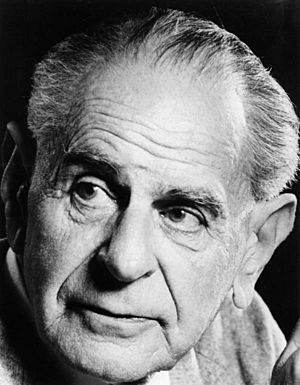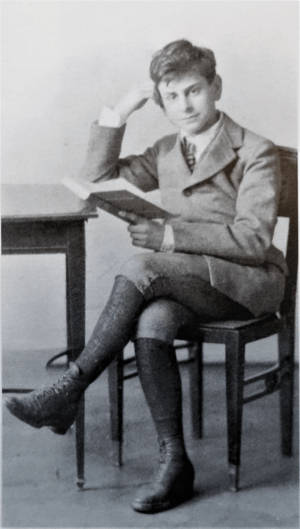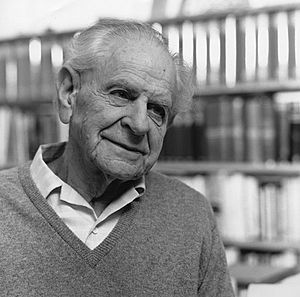Karl Popper facts for kids
Quick facts for kids
Karl Raimond Popper
|
|
|---|---|

Sir Karl Popper c. 1980s
|
|
| Born | July 28, 1902 Vienna, Austria |
| Died | September 17, 1994 (aged 92) London, England |
| Era | 20th century philosophy |
| Region | Western Philosophy |
|
Main interests
|
Epistemology Philosophy of science Social and political philosophy |
|
Notable ideas
|
Falsifiability Hypothetico-deductive method Open society |
|
Influences
Kant · Schopenhauer · Hegel Einstein · Kierkegaard · Wittgenstein Vienna Circle · Tarski · Selz Russell · Campbell · Burke |
|
Sir Karl Popper (July 28, 1902 – September 17, 1994) was an important Austrian and British philosopher. He was a professor at the London School of Economics.
Many people consider him one of the most important philosophers of science of the 20th century. He also wrote about how societies and governments should work. He was especially against totalitarian ideas, which are systems where the government has total control over people's lives. Popper is famous for his idea of falsification. This means that for a scientific idea to be good, it must be possible to prove it wrong.
Contents
Early Life and Education
Karl Popper was born in Vienna, which was then part of Austria-Hungary. His parents were from a Jewish background but had become Christian. Karl grew up following the Lutheran faith. He studied at the University of Vienna.
His father, Dr. Simon Siegmund Carl Popper, was a lawyer and loved books. He had a huge personal library with over 12,000 books! Karl inherited this love for books from his father.
In 1919, Karl became interested in Marxism, a political and economic theory. He joined a group for socialist school students and the Social Democratic Party of Austria. This party followed Marxist ideas at the time. However, he soon became unhappy with Marxism and left the group. For the rest of his life, he quietly supported social liberalism, which is a political belief that combines individual freedom with social justice.
In 1928, he earned a special degree called a doctorate in Psychology. From 1930 to 1936, he worked as a teacher in secondary schools. His first book, Logik der Forschung (which means The Logic of Scientific Discovery), came out in 1934. In this book, he shared his new idea of falsifiability. This idea suggests that a scientific theory is only truly scientific if it can be tested and potentially proven wrong.
Career and Achievements
In 1937, the rise of Nazism (a very extreme political movement) and the threat of the Anschluss (Germany taking over Austria) made Popper move away. He went to New Zealand and became a philosophy lecturer at Canterbury University College in Christchurch.
In 1946, he moved to England. He started working at the London School of Economics as a reader in logic and scientific method. He became a full professor there in 1949.
Popper was the president of the Aristotelian Society from 1958 to 1959. In 1965, Queen Elizabeth II made him a knight, so he became "Sir Karl Popper." In 1976, he was chosen as a Fellow of the Royal Society, a very respected group of scientists.
He stopped working full-time in 1969, but he kept thinking and writing about philosophy for the rest of his life. In 1982, he received another special award, becoming a Companion of Honour. Popper was also a member of the Academy of Humanism. He said he was an agnostic, meaning he wasn't sure if God existed, but he respected the moral teachings of Judaism and Christianity.
Popper received many awards for his work. These included the Lippincott Award, the Sonning Prize, and special memberships in many famous groups like the British Academy and King's College London. Austria also gave him a high honor called the Grand Decoration of Honour in Gold.
Popper's Philosophy
Popper called his way of thinking "critical rationalism." He believed that scientific theories are like big ideas that can't be directly seen or touched. Instead, we can only test them indirectly. He also thought that new scientific ideas, and all human knowledge, come from our creative imagination. We use this imagination to solve problems that come up in different times and cultures.
In his book All Life is Problem Solving, Popper tried to explain why scientific knowledge seems to get better over time. He wanted to understand how our understanding of the universe keeps improving.
One of his most important ideas was about the "problem of induction." This problem asks how we can be sure that something will happen in the future just because it has always happened in the past. For example, we believe the sun will rise tomorrow because it always has. Popper said that while we can't prove the sun will rise, we can make a theory that it will. If one day it doesn't rise, then our theory would be proven wrong, or "falsified." Until that happens, we can continue to believe the theory is true.
Popper agreed with another philosopher, David Hume, who also thought there's no perfect logical reason to assume the future will be like the past.
Popper also had ideas about the mind and body. He didn't think the mind was a completely separate thing from the body. Instead, he believed that mental things, like thoughts and feelings, are different from physical things, but they are still connected to people.
Death
Karl Popper passed away in 1994. His ashes were taken to Vienna and buried next to his wife, Josefine Anna Henninger, in the Lainz cemetery.
Published Works
Here are some of the books Karl Popper wrote:
- The Two Fundamental Problems of the Theory of Knowledge, 1930–1933 (published as a German book 1979, English translation 2008), ISBN: 0415394317
- The Logic of Scientific Discovery, 1934 (originally Logik der Forschung, English translation 1959), ISBN: 0415278449
- The Poverty of Historicism, 1936 (published as a book 1957), ISBN: 0415065690
- The Open Society and Its Enemies, 1945 Vol 1 ISBN: 0415290635, Vol 2 ISBN: 0415290635
- Quantum Theory and the Schism in Physics, 1956–57 (published as a book 1982), ISBN: 0415091128
- The Open Universe: An Argument for Indeterminism, 1956–57 (published as a book 1982), ISBN: 0415078652
- Realism and the Aim of Science, 1956–57 (published as a book 1983), ISBN: 0091514509
- Conjectures and Refutations: The Growth of Scientific Knowledge, 1963, ISBN: 0415043182
- Of Clouds and Clocks: An Approach to the Problem of Rationality and the Freedom of Man, 1965
- Objective Knowledge: An Evolutionary Approach, 1972, Rev. ed., 1979, ISBN: 0198750242
- Unended Quest: An Intellectual Autobiography, 2002 [1976]. ISBN: 0415285895)
- The Self and Its Brain: An Argument for Interactionism (with Sir John C. Eccles), 1977, ISBN: 0415058988
- In Search of a Better World, 1984, ISBN: 0415135486
- Die Zukunft ist offen (The Future is Open) (with Konrad Lorenz), 1985 (in German), ISBN: 349200640X
- A World of Propensities, 1990, ISBN: 1855060000
- The Lesson of this Century, (Interviewer: Giancarlo Bosetti, English translation: Patrick Camiller), 1992, ISBN: 0415129583
- All Life is Problem Solving, 1994, ISBN: 0415249929
- The Myth of the Framework: In Defence of Science and Rationality (edited by Mark Amadeus Notturno) 1994. ISBN: 0415135559
- Knowledge and the Mind-Body Problem: In Defence of Interaction (edited by Mark Amadeus Notturno) 1994 ISBN: 0415115043
- The World of Parmenides, Essays on the Presocratic Enlightenment, 1998, Edited by Arne F. Petersen with the assistance of Jørgen Mejer, ISBN: 0415173019
- After The Open Society, 2008. (Edited by Jeremy Shearmur and Piers Norris Turner, this volume contains a large number of Popper's previously unpublished or uncollected writings on political and social themes.) ISBN: 978-0415309080
- Frühe Schriften, 2006 (Edited by Troels Eggers Hansen, includes Popper's writings and publications from before the Logic, including his previously unpublished thesis, dissertation and journal articles published that relate to the Wiener Schulreform.) ISBN: 978-3161476327
Images for kids
-
Popper with Professor Cyril Höschl, while receiving an honorary doctorate from Charles University in Prague in May 1994.
See also
 In Spanish: Karl Popper para niños
In Spanish: Karl Popper para niños







